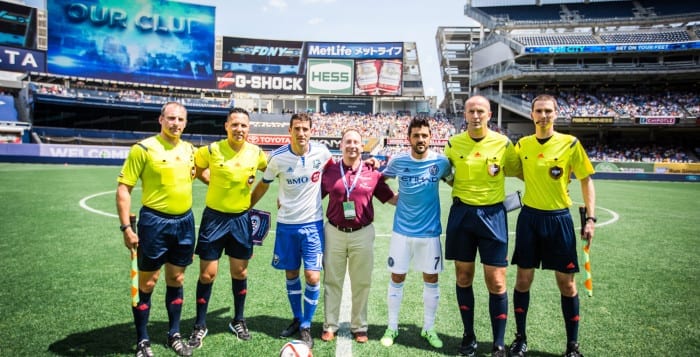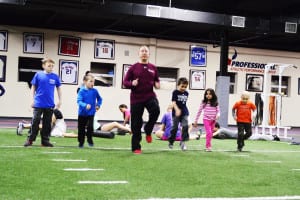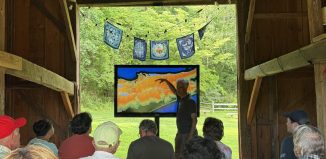Kings Park native helps young cancer patients regain strength

By Clayton Collier
Kings Park native Paul Fick has helped hundreds get “back in the game.”
This past Saturday, Fick had the opportunity to help 22 Major League Soccer soccer players get their game started with the coin flip at Yankee Stadium prior to the match between the New York City Football Club and the Montreal Impact.
Before a crowd of more than 27,000, Fick was selected for the honor by Coco Joy in recognition for his work with Back in the Game, an organization he co-founded that helps young cancer patients regain strength, balance, flexibility, and confidence in an effort to return the children to a condition where they can participate in sports and physical activities again.
“It’s really not about me at all,” he said. “I just have been the beneficiary of working with these children and getting to watch them progress through their treatment. It’s about the program; it’s not about one individual. I was the representative, but it was great to see Back in the Game get more awareness so we can help more kids throughout the area.”
Fick was also recently nominated as the Leukemia & Lymphoma Society’s Man of the Year. Gilbert Salon, a volunteer for Back in the Game for the last five years, said the recognition is well-deserved.
“He’s been running that program for nearly 10 years,” he said. “His dedication, year after year, all the work he puts in, it’s really amazing.”
The program is run through Professional Physical Therapy in Garden City and is funded by the Miracle Foundation.
The idea for Back in the Game was started by Rob Panariello, a Professional Physical Therapy founding partner, and his friend Peter Menges. The inspiration for the program began when Menges’ son, Bobby, broke his leg on a relatively mild slope while skiing after doctors deemed him to be in remission from cancer. It wasn’t until after the fact that they realized that, while his son had responded to the treatment in getting rid of the cancer, his body had not fully recovered.
“His body wasn’t ready to go back to physical activities yet,” Fick said.

Photo from Fick
Menges said at the time of his son’s injury, he realized that there needed to be a heightened focus on post-treatment life for children like Bobby.
“I think the disconnect was that the physicians were encouraged because the kids were responding favorably to the treatment and wasn’t that great, but what they weren’t seeing was a kid that used to participate in soccer or lacrosse or football, can’t even participate in gym class,” Menges said of his experiences following his son’s cancer treatment. “So yeah, they’re doing fine from a treatment standpoint, but they’re not doing well from a physical participation life standpoint.”
Menges said once the concept was organized, Fick was brought in to structure the program into what it is today.
“He was a real catalyst for taking the idea, figuring out how to make it work and bringing it to life,” he said.
To make the idea of Back in the Game a successful reality, the men presented the idea to Dr. Mark Weinblatt at Winthrop-University Hospital. Weinblatt’s endorsement was crucial to the program getting off the ground.
“Doctor Weinblatt was very supportive in recognizing the need for the program and referring the kids to us,” Fick said. “The trust that he had in Rob and myself enabled us to work with the kids. If we didn’t have that, it would have been very difficult.”
Nine years later, Weinblatt said the program is a terrific success.
“A lot of our patients, who really had a lot of difficulty in getting back to their usual routine, found it an immense help, not just in sports but in feeling good about themselves in day-to-day activities,” he said. “Walking around, going up stairs; the things we take for granted have been helped a lot by the program. They really do a terrific job with our patients.”
Through their work with the Miracle Foundation, the services provided by Back in the Game come at no cost to the families of the children recovering from cancer.
Though Fick doesn’t like to take any credit, Menges said the program, like Saturday’s game at Yankee Stadium, couldn’t have occurred without Fick getting things started.
“Paul has embraced the concept and program from the beginning, and transformed it from an idea into a highly organized and professional program,” he said. “He is great with the kids and parents, and has continuously worked to grow and improve the program. His dedication and passion is incredible.”






